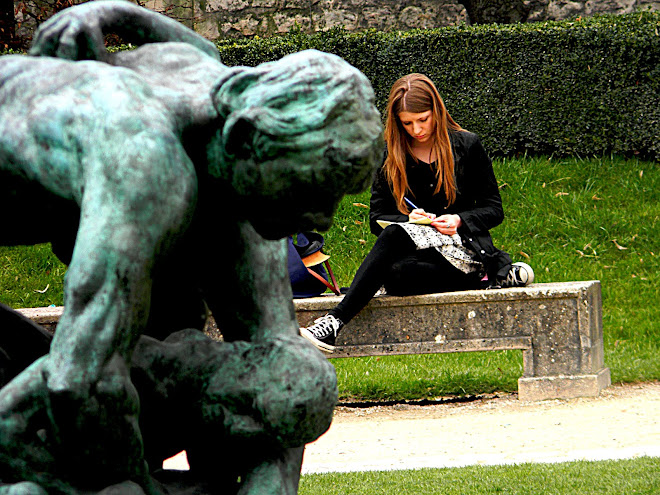New York began for me on Sunday, the
nineteenth of August, when I was not quite twenty-two years old. As my plane began its descent into LaGuardia
I looked out my window for views of a glittering skyline or the Statue of
Liberty. Instead I saw muddy brown
waters and brown buildings, gray roads and a sad, gray sky. When my plane had left Chicago that morning I
had watched the skyline tower and shine in the hazy silver morning mist,
keeping my eyes on the city until the very last skyscraper was out of sight, as
if I was taking a last look at an old love.
When my taxi driver took me over a
bridge on my way from LaGuardia to the New York City apartment I would be
sharing with two roommates who I hadn’t met yet, I asked him the name of the
bridge. And when he said it was the
Triborough I smiled and made a note to write about how I had rode over the same
bridge that my favorite writer, Joan Didion, had rode over when she first came
to New York. But for the most part, on that first Sunday, New York was not even
a place to me but a sad, gray, misremembered dream. I wandered from my William Street apartment
to Fulton Street, which was lined with open-air shops and vendors. I looked at it as if from a distance even as
excited tourists bumped up against me.
I walked on Fulton for a while until
I reached the South Street Sea Port, a place of cobblestones and life-size
pirate ships, acrobats and storefronts that looked like London. And as crowds merged and swirled around me I
felt lost and alone even though I knew exactly where I was. That was the thing about being in New York –
it didn’t feel like mine, nor did it initially feel like a place that I could be. It felt like it belonged to the tourists of
the world and to the artists and the Wall Street brokers and the kind of people
who lived in high rises or brownstones.
For the first couple days I moved
about New York not in youthful or touristy awe but in the practiced irritation
of someone who has lived and worked and loved in a city, someone who has run to
catch a train and missed it and showed up late for drinks with a friend and
been overly bothered by the inconvenience of the whole thing because it had
been raining all day and the wind had blown their umbrella inside out. But then, on my fourth night in the
city, I met a man outside a bar when the friend I was with asked him for a
cigarette. And I had thought to myself that he was talking in a real New York
accent. It turned out he was from
Boston; I was just too new to New York to hear the difference.
That night was a wine and whiskey dream -- dark
but bleeding brightness. My friend and I took a taxi with this man and
his friend back to their apartment because they said they had a roof deck and
we wanted to see the city from the sky and we were still young enough to
believe in people. As the taxi carried
us uptown, they were talking and the window was rolled down so I stuck my head
out, so I could feel the air and the city. The wind rushed summer cool
and dirty against my cheeks and I could see the dark shapes of buildings and
the blurred red, green and orange lights of bodegas and bars and traffic.
And then I was their roof looking out at the East River and down towards the
Upper East Side and everything was still but sill all wine and whiskey, still
darkness with light bleeding in. The
city was sprawling out before me, like the possibilities I swore I no longer
believed in.
He handed me a Corona and I quoted for him from
my favorite movie, Annie Hall, because
he said it was also his favorite movie.
And when I had
finished quoting Woody Allen paraphrasing Groucho Marx saying, “I wouldn’t want
to belong to any club that would have someone like me as a member,” he smiled,
stepped a little closer, and said, “That was good but here’s how it really
goes.”
And
soon that’s what I was telling myself. Here’s how it really goes. New York had to be the real start I had been waiting for.



No comments:
Post a Comment